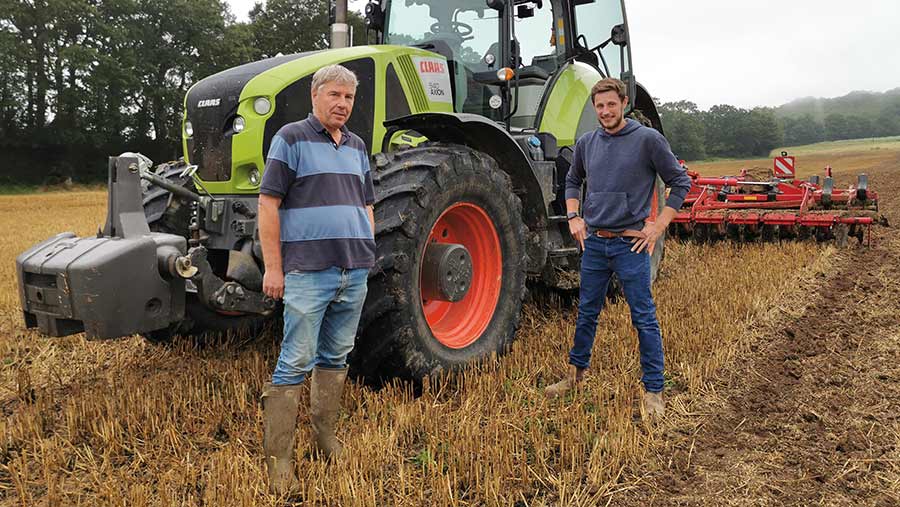Video: Farmer demands clarity on autumn muckspreading ban
 Farm manager Peter Knight (left) and farmworker Ben Ellis © MAG/Philip Case
Farm manager Peter Knight (left) and farmworker Ben Ellis © MAG/Philip Case A Surrey farmer is demanding clarity from the Environment Agency (EA) on behalf of all farmers over its effective ban on most manure applications to arable land in the autumn.
Peter Knight has an agreement with Thames Water to spread treated sewage sludge, also known as “biosolids”, each autumn on a third of the fields at his 160ha home farm in Hambledon.
But new guidance published by the EA on 3 August on the spreading of organic manure looks set to have a big impact on his farming business – and many others across England.
See also: Analysis: Industry reacts to new autumn muckspreading rules
Under Rule 1 of the Farming Rules for Water, and the accompanying regulatory position statement RPS 252, farmers will have to justify why they need to apply organic manures in the autumn.
The RPS effectively makes it impossible to apply manures, biosolids or digestate ahead of arable crops – unless it is being applied to grass, ahead of oilseed rape, or where a derogation has been agreed.
The EA says farmers applying organic manures in the autumn carries a pollution risk of nitrates and phosphate entering watercourses. It maintains there is no justifiable need to do so ahead of sowing a winter cereal.
Watch a video of Peter Knight explaining the benefits of spreading biosolids to his arable land and read the rest of the report below.
No consultation
Mr Knight farms about 800ha in the Hambleden area including contract farming. He said it was “totally impractical” on a farm level for the EA to have published its RPS without launching a consultation or giving farmers time to adjust.
At that point, 3,000t of biosolids had been delivered to his farm, ready to apply this autumn.
About 80% of the farm is in winter cropping, so the land would not be available to have biosolids applied in the spring, the EA’s preferred option.
Ground conditions in late summer/early autumn were also more favourable than in the spring, Mr Knight said. And stockpiling biosolids on farm over the winter months carried a “significant pollution risk”.
Following lobbying from the NFU and Thames Water, the EA gave permission for the biosolids to be spread this autumn on the home farm at about 27-28t/ha.
The sludge was being incorporated within 24 hours of being applied to fields last week.
Before any sludge can be applied, Mr Knight must show Thames Water evidence of soil analysis to demonstrate that the crop/soil has a requirement. “If your soil indices are already too high, you can’t apply it,” he explained.
Biosolids have been spread at the farm for more than 20 years. Mr Knight says the material contains phosphate, nitrogen, sulphur and trace elements, and supplies organic matter (OM). Its use also increases his cereal yields by approximately 0.5t/ha.
But Mr Knight said it was unclear if the agency would allow the agreement between him and Thames Water to continue after next spring’s cut-off date.
ELM ambition
Defra has stated that improving soil health on farms in England will be a key ask of its upcoming Environmental Land Management (ELM) scheme.
Mr Knight questioned whether there had been any joined-up thinking between the EA on RPS 252 and Defra, because part of improving soil health involved applying more OM.
“Many thousands of tonnes of organic manure are applied to farms each year, whether it’s green waste compost, biosolids, or farmyard manure.
“It’s part of the farming cycle and has been for hundreds of years. It’s not going to stop being produced. Where’s it going to go?
“Organic farmers are going to be penalised even more than conventional farmers. At least we can buy something out of a bag, although it will cost us more money and I don’t think it’s the right thing to do.”
NFU advice on how farmers should approach ban
The NFU and other industry stakeholders are involved in discussions with the EA to try to find solutions to the autumn muckspreading ban.
Following NFU lobbying, Defra updated its RPS content on the gov.uk website on 25 August to include a statement from the EA detailing how farmers should approach spreading manures this autumn.
Farmers who cannot comply with the conditions in the RPS should email enquiries@environment-agency.gov.uk or call 03708 506 506 (general enquiries).
For this autumn, the EA has said it will allow muckspreading activities that will not cause “significant risks”, which offers more flexibility than before for farmers who cannot comply with Rule 1 of Farming Rules for Water or the regulatory position statement (RPS) 252 that accompanies it.
The NFU is urging its members to take independent advice before proceeding down this route.
